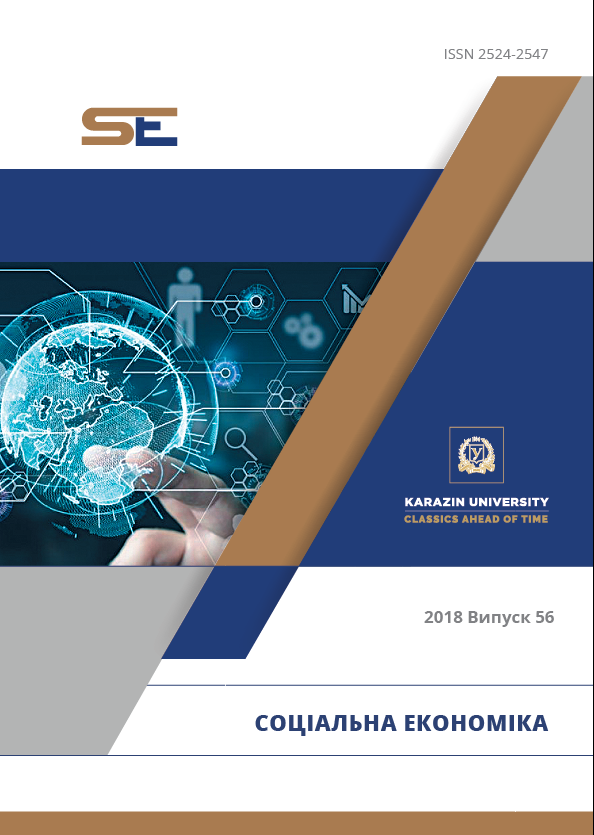Competence Approach as a Basis for Personnel Support for Strategic Administrative Accounting at the Enterprise
Abstract
The article is devoted to the study of the competence approach as the basis for staffing strategic management accounting in the enterprise. The analysis of the scientific literature showed that the distinctive features of strategic management accounting is that the priority direction for the formation of information in its system is to satisfy the information needs of strategic management in terms of accounting and analysis of key success factors, risks and the formation of strategic management reporting. The essence of the concept «competence» is investigated and the determinant of professional competence of a specialist in strategic management accounting based on the concept of competence is substantiated. Based on a structural approach, the components of professional competence of a specialist in strategic management accounting are proposed.
To assess the overall competence of specialists in strategic management accounting at the enterprise level, an integral indicator has been proposed that is formed according to the following criteria: cognitive motivation, professional skills, interpersonal and communication skills, management skills, collective skills, the indicator «Specialist in strategic management accounting through the eyes of an enterprise manager». A template has been developed for presenting the results of an assessment of the overall competence of a specialist in strategic management accounting.
According to the results of the study, it was established that the implementation of a strategy for the sustainable functioning of business entities in a market economy places new demands not on specific knowledge, but on the competences of employees, their personal qualities. The proposed methodological approach to assessing the overall competence of specialists in strategic management accounting is universal and can be adapted for use in enterprises from any legal form and industry. The value of the methodical approach lies in the fact that it will not only enable managers and managers of enterprises to assess the competence of staffing for strategic management accounting based on the key components of the overall competence of a strategic management accounting specialist, but also creates innovative tools to enhance effective strategic management of the enterprise as a whole.
Downloads
References
Bondar, M. І. (2010). Conceptual approaches to the development of accounting in Ukraine [“Konceptual`ni pidxody` shhodo rozvy`tku buxgalters`kogo obliku v Ukrayini”]. Zbіrnik materіalіv mіzhnarodnoї naukovo-praktichnoї konferencії “The role and place of accounting, control and analysis in the development of economic science and practice”. Kyiv: KNEU, рр. 21‒24.
Vahrushina, M. A. (2014). Problems and prospects for the development of Russian management accounting [“Problemy i perspektivy razvitija rossijskogo upravlencheskogo ucheta”] Mezhdunarodnyj buhgalterskij uchet, 33(327), рр. 13‒23.
Popovich, V. І. (2013), Theoretical foundations of organization of strategic accounting at enterprises [“Teorety`chni osnovy` organizaciyi strategichnogo obliku na pidpry`yemstvax”] Vіsnik Nacіonal’nogo unіversitetu vodnogo gospodarstva ta prirodokoristuvannja, 1(61), рр. 187‒192.
Pilipenko, A. A. (2007). Organization of accounting and analytical support of strategic development of the enterprise [“Organіzacіja oblіkovo-analіtichnogo zabezpechennja strategіchnogo rozvitku pіdpriєmstva”]. Kharkiv: HNEU.
Rajan, B. (1998). Strategic accounting for the head [“Strategicheskij uchet dlja rukovoditelja”]. Moskva: Audit.
Uord, K. (2002). Strategic management accounting [“Strategicheskij upravlencheskij uchet”]. Moskva: Olimp-Biznes.
Belousova, I. К. (2009). The development of the accounting profession as an important factor in overcoming the economic crisis in Ukraine [“Rozvytok bukhhalters’koi profesii iak vazhlyvyj chynnyk podolannia ekonomichnoi kryzy v Ukraini”]. Bukhhalters’kyj oblik i audyt: naukovo-praktychnyj zhurnal, 5, рр. 4‒12.
Butynets, F. F., Davydiuk, T. V., Maliuha, N. M. and Chyzhevska, L. V. (2002). Accounting management [“Bukhhalterskyi upravlinskyi oblik”]. Zhytomyr: Ruta.
Holov, S. F. (2003). Managerial Accounting [“Upravlinskyi oblik”]. Kyiv: Libra.
Yershova, N. Yu. (2017). Determinant of professional competence of manager of accounting [“Determinanta profesijnoyi kompetentnosti faxivcya z upravlins`kogo obliku”]. Zbіrnik materіalіv mіzhnarodnoї naukovo-praktichnoї konferencії “Ekonomika, finansy, bukhhalters’kyj oblik: suchasnyj stan i perspektyvy rozvytku”. Poltava, рр. 21‒24.
Pushkar, M. S. (1999). Trends and regularities of accounting development in Ukraine (theoretical and methodological aspects) [“Tendencії ta zakonomіrnostі rozvitku buhgalters’kogo oblіku v Ukraїnі (teoretiko-metodologіchnі aspekti”]. Ternopіl’: TNEU.
Davenport, T., Harris, J., De Long, D. and Jacobson, A. (2001). Data to Knowledge to Results: building an analytic capability. California management review, 41(2), рр. 117‒138.
Ittner, C. D. and Larcker, D. F. (2006). Moving from Strategic Measurement to Strategic Data Analysis. Chapman C.S. (ed.). Controlling Strategy. Oxford University Press, 12(2), рр. 86‒106.
Hemmingway, C. (2010). Developing Information Capabilities. Analytics to Action research project. Cranfield School of Management. Oxford University Press, 8(1), рр. 92‒107.
Universal Dictionary-Encyclopedia [“Universal’nyj slovnyk-entsyklopediia”]. (2006). Kyiv: «TEKA».
Prahalad, K. K. and Hamel, G. (2003). Key Corporate Competences [“Kljuchevye kompetencii korporacij”]. Vestnik S.-Peterburgskogo un-ta. Ser. Menedzhment, 3, pp. 18‒23.
Andreev, A. L. (2005). Competence paradigm in education: the experience of philosophical and methodological analysis [“Kompetentnostnaja paradigma v obrazovanii : opyt filosofsko-metodologicheskogo analiza”]. Pedagogika, 4, pp. 19–27.
Makarov, A. S., Maksimov, A. G., Leonova, L. A. and Sharunina, A. V. (2010). Formation of multi-factor criteria for assessing the viability of the organization using the MAI and econometrics [“Formirovanie mnogofaktornyh kriteriev ocenki sostojatel'nosti organizacii s ispol'zovaniem MAI i jekonometriki”]. Jekonomicheskij analiz: teorija i praktika, 30, pp. 32‒40.
Gmurman, V. E. (1977). Theory of Probability and Mathematical Statistics [“Teorija verojatnostej i matematicheskaja statistika ”]. Moscow: Vysshaja shkola.




